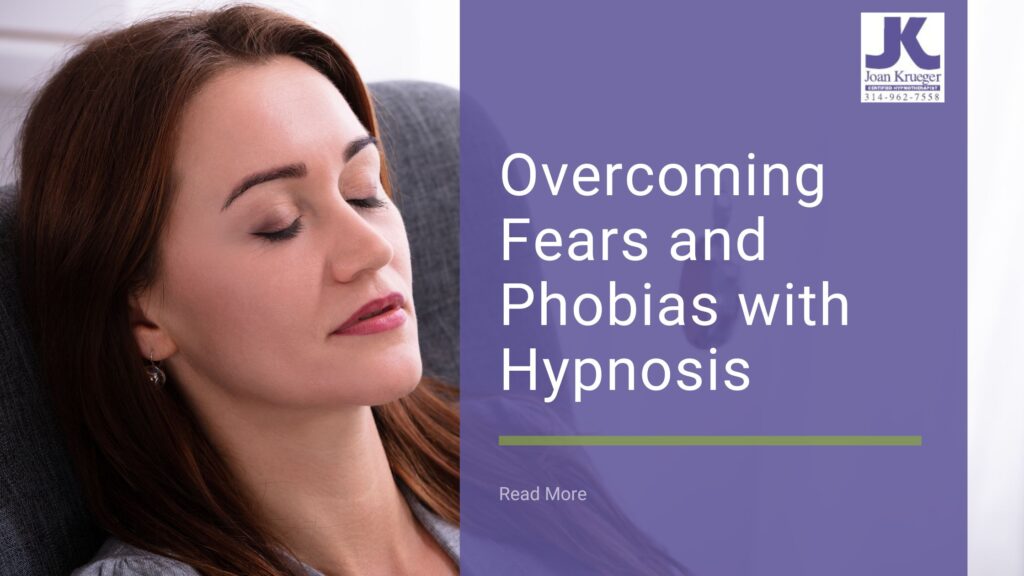- Hypnosis works by accessing the subconscious mind to uncover and reframe the root cause of irrational fears and long-held phobias.
- Through guided imagery, desensitization, and belief reprogramming, hypnosis provides lasting relief without medication or exposure-based stress.
- Joan Krueger Hypnosis offers a compassionate, customized approach to help clients overcome fears and step into life with renewed confidence and peace.
Fear is a natural and essential part of the human experience. It protects us, keeps us alert to danger, and often sharpens our decision-making. But when fear becomes disproportionate, irrational, or persistent—when it shows up without a true threat—it can limit a person’s life in significant ways.
Phobias, which are intense fears related to specific objects, situations, or experiences, can feel overwhelming and impossible to control. Whether it’s the fear of flying, public speaking, heights, needles, or something less common like buttons or clowns, phobias take root deep within the subconscious mind—and that’s precisely why hypnosis can be such a powerful solution.
Hypnosis offers a unique way of addressing fear that bypasses the conscious mind’s defenses and gets to the root of the issue. Instead of relying on willpower or repeated exposure alone, hypnosis opens the door to change by working directly with the subconscious—the place where fear first formed, and where it can ultimately be transformed.
Understanding the Subconscious Nature of Fear
When we talk about fear and phobias, we’re not just discussing fleeting emotions. We’re addressing deeply conditioned responses. For someone with a snake phobia, even a picture in a magazine can trigger a racing heart and a fight-or-flight reaction. These responses aren’t rational, and most people with phobias know this. But that doesn’t make the fear feel any less real.
The reason fear persists despite conscious logic lies in the subconscious mind. It holds on to past experiences, associations, and emotional patterns—often from childhood or even forgotten moments—and uses those memories as reference points. If your subconscious once decided that dogs were dangerous because of a scary encounter at age three, it may continue to trigger fear around dogs decades later, long after your conscious mind knows most dogs are safe.
That’s what makes hypnosis so valuable. Rather than trying to override these ingrained responses through surface-level techniques, hypnosis allows for a more direct and compassionate re-education of the subconscious. The goal is not to suppress fear but to reframe the original story so that the mind no longer perceives danger where none exists.
What Hypnosis Is—And Isn’t
Many people think of hypnosis as something mysterious or theatrical, shaped by movies or stage performances. But clinical hypnosis is a well-established therapeutic approach that has helped thousands of people change how they think, feel, and behave.
Hypnosis is not mind control, sleep, or a loss of awareness. Rather, it’s a focused, relaxed state of heightened awareness—much like the state you’re in when you’re deeply absorbed in a book or a daydream. In this state, the conscious mind quiets down, allowing the subconscious to become more receptive to positive suggestions, guided visualizations, and memory reframing.
With the help of a skilled hypnotherapist, clients remain in control throughout the process. The suggestions given during hypnosis are tailored to the person’s needs and are based on their willingness to change. You cannot be made to think or do anything against your values. In fact, hypnosis feels natural, empowering, and often surprisingly familiar.
Why Hypnosis Works for Fears and Phobias
The success of hypnosis for fear and phobia lies in its ability to interrupt the automatic fear response and replace it with a calmer, more balanced reaction. It does so in several ways:
Uncovering the Root Cause
In many cases, the person with a phobia may not remember where the fear started. Hypnosis can gently guide the mind to the original moment or memory where the association formed. This process is done with care, often without re-traumatizing, allowing the subconscious to process the event in a new, less threatening way.
Desensitizing the Trigger
Once the fear trigger is identified, hypnosis can help neutralize the emotional charge associated with it. Through repeated sessions, the person becomes less reactive to the source of their fear. For example, someone with a fear of flying may be guided to visualize a calm and safe flight experience while in a hypnotic state, gradually rewiring how the brain and body respond to flying.
This kind of mental rehearsal becomes powerful because the brain often doesn’t distinguish between vividly imagined events and real ones. Hypnosis leverages that principle to help the person practice calm responses until they become the default reaction.
Rewriting Limiting Beliefs
Many phobias are linked to subconscious beliefs like “I’m not safe unless I avoid this,” or “I can’t cope with this situation.” Hypnosis allows those limiting thoughts to be replaced with empowering alternatives—beliefs rooted in safety, capability, and control.
More Than Just Coping: Real Freedom from Fear
One of the most common outcomes of hypnosis for phobias isn’t just reduced fear—it’s a complete emotional shift. Many clients report that they no longer feel triggered at all by what once caused them panic. They aren’t simply managing anxiety with techniques—they’re experiencing true freedom.
This kind of change often brings about a ripple effect. Someone who once feared elevators may begin to say yes to job interviews in high-rise buildings. A person who avoids bridges might take a road trip. A formerly terrified public speaker might give a wedding toast. When the grip of fear loosens, life opens up.
For many clients, it’s not even just about the phobia. The success they experience through hypnosis boosts their overall confidence. They start to believe in their ability to change other areas of their life too, such as stress management, self-esteem, or even habits like procrastination and emotional eating. In this way, the benefits of overcoming a single fear often extend far beyond the original goal.

Who Can Benefit from Hypnosis for Phobias?
Hypnosis is a safe and effective method for many types of fears and phobias, including but not limited to:
- Flying
- Public speaking
- Heights
- Driving
- Enclosed spaces (claustrophobia)
- Spiders, snakes, and other animals
- Water
- Needles or medical procedures
- Social situations
- Germs or contamination
But hypnosis is also valuable for those with more subtle fears, like the fear of rejection, failure, or being judged. These may not qualify as traditional phobias, but they shape behavior in limiting ways. Hypnosis can help here, too, by uncovering where those fears originated and allowing for new inner narratives to take their place.
How the Process Typically Works
Each hypnosis practitioner will have their own process, but here’s what clients can usually expect:
Initial Consultation
This first session is about gathering information and creating rapport. The hypnotherapist will ask about the fear, its history, how it affects daily life, and what the client hopes to achieve. It’s also a time to explain what hypnosis is, dispel myths, and answer questions.
Customized Hypnosis Sessions
Subsequent sessions will guide the client into a hypnotic state where the therapist can introduce imagery, metaphors, affirmations, or regression techniques tailored to the client’s needs. Each session builds upon the last, reinforcing new patterns of thought and behavior.
Integration and Self-Hypnosis
Many hypnotherapists teach clients how to use self-hypnosis or provide recorded sessions to reinforce the work between appointments. This empowers the individual to take the practice into their daily life, making the results more sustainable over time.
Some clients experience major shifts after just one or two sessions, while others may benefit from a short series of appointments, depending on the depth and complexity of the fear.
The Science Behind Hypnosis for Fear
Scientific research has increasingly supported the effectiveness of hypnosis, particularly for anxiety-related conditions. Studies using brain imaging have shown that hypnosis can influence areas of the brain involved in perception, attention, and emotional regulation. During hypnosis, activity in the amygdala—the brain’s fear center—can be modulated, creating the opportunity for calmer reactions to formerly distressing stimuli.
Additionally, clinical trials have demonstrated the usefulness of hypnosis for specific phobias, such as dental anxiety and fear of flying, often with outcomes that surpass traditional exposure therapies. While hypnosis is still underused in mainstream therapy settings, its potential continues to gain recognition, especially as a complementary approach.
Why Choose Hypnosis Over Other Methods?
There are many ways to treat phobias, including cognitive behavioral therapy (CBT), medication, and exposure therapy. Each has its place. However, hypnosis stands out for its gentle, non-invasive nature and its ability to create change from the inside out.
Rather than desensitizing the individual through forced exposure, hypnosis allows them to experience safety and control from the comfort of their inner world first. That shift then translates into real-world behavior. Hypnosis is also drug-free, involves minimal side effects, and can address multiple fears or emotional patterns simultaneously.
It’s particularly well-suited for individuals who feel stuck, have tried other methods with limited success, or want a holistic path to healing.
A New Relationship with Fear
Ultimately, overcoming a fear or phobia with hypnosis is about more than just “getting over it.” It’s about forming a new relationship with your inner world—one where calm, curiosity, and confidence take the place of avoidance and anxiety. It’s about honoring the mind’s original intention to protect you while gently guiding it toward more accurate, helpful responses.
Fear doesn’t have to run the show. Through hypnosis, it’s possible to uncover the real story, rewrite the script, and reclaim the parts of life you’ve been avoiding.
And in the process, you may discover just how powerful your mind truly is—especially when you stop fighting your fears and start working with them.
Ready to let go of fear and move forward with confidence? At Joan Krueger Hypnosis, I offer compassionate, personalized support to help you overcome phobias and live fully. Book your first session today and experience the calm you deserve.

